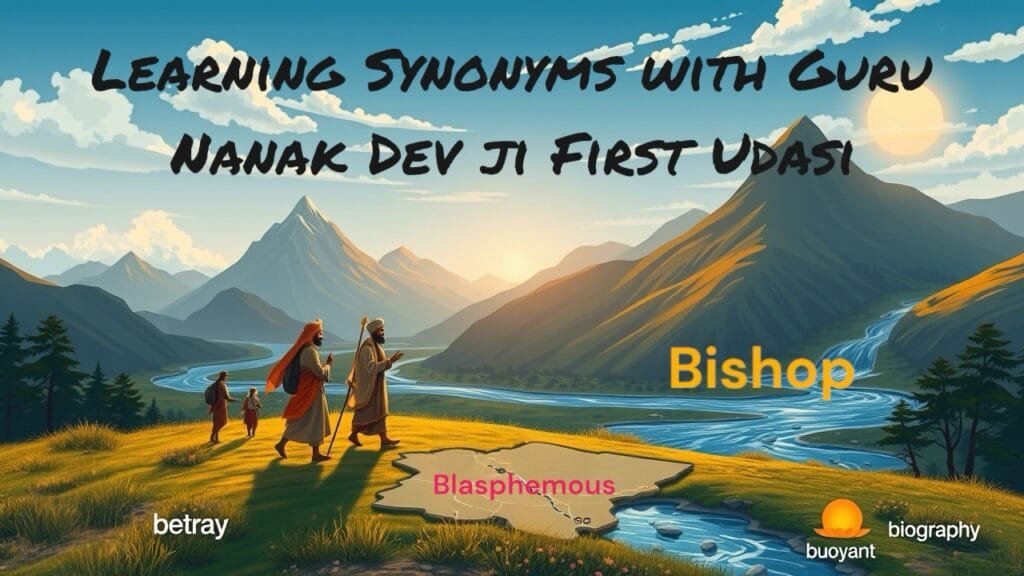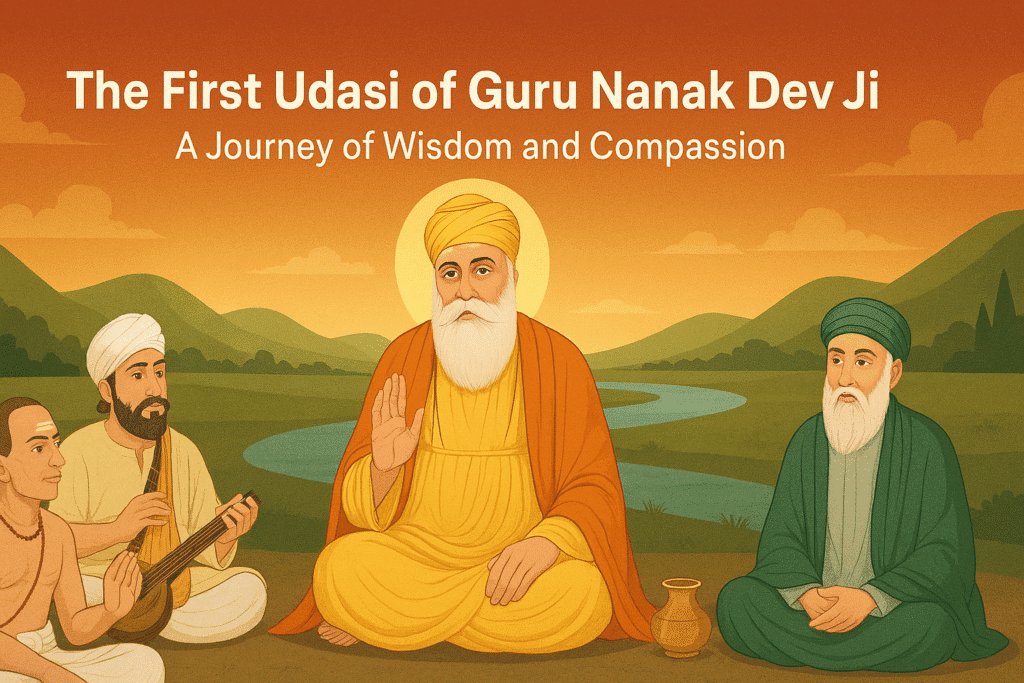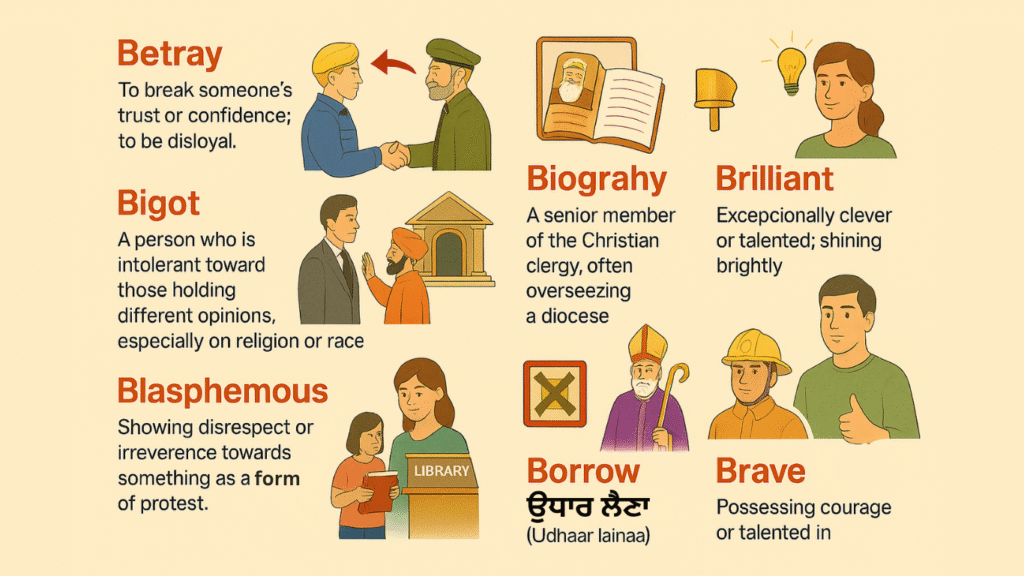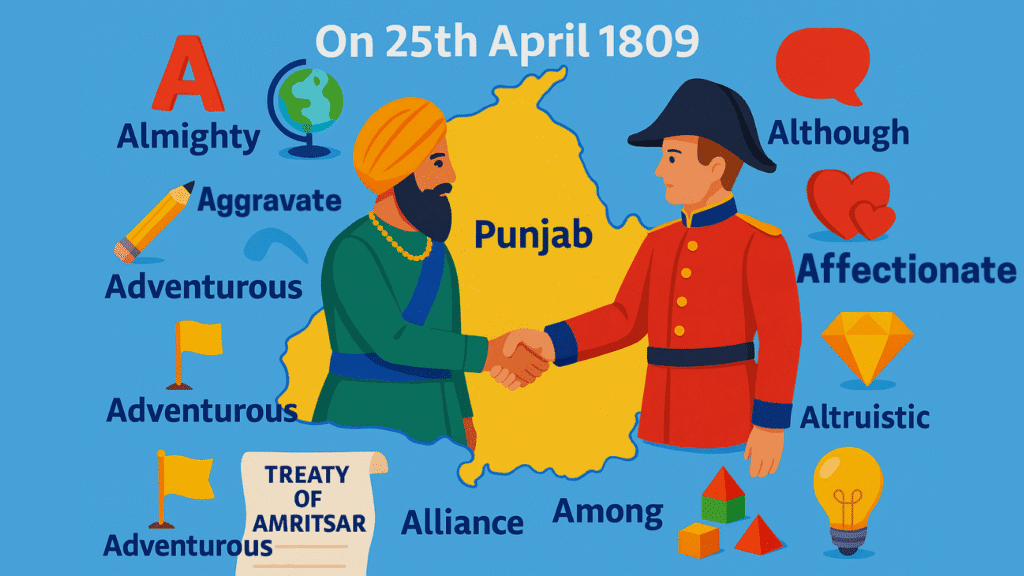
In this article, we will learn 10 new English words while exploring the inspiring story of Guru Nanak Dev Ji’s First Udasi. Through this article, we will witness Guru Nanak Dev Ji’s travels for the sake of humanity, spreading devotion and love for God, and fostering a sense of unity and compassion in society for the betterment of all people.
This article specially designed for the Punjab Civil services exam, Excise Inspector, Senior Assistant, Patwari, Labour Inspector, Clerk and other government related exams for the English synonyms which often have a percentage of roughly 5-10% of the weightage of the exams. In this article we are continuing our previous series of learning these words with story line of our history with new words if you have not read those article yet you can learn these articles whose link are shared in the end of this article below you can learn after completing this article.
Table of Contents
The First Udasi of Guru Nanak Dev Ji: A Journey of Wisdom and Compassion

Guru Nanak Dev Ji embarked on his first Udasi (spiritual journey) in 1499 AD to spread the message of oneness, equality, and devotion to God. His journey took him to various places, where he addressed social issues, challenged bigotry, and inspired people to live a life of truth and compassion. Below is a detailed and factful account of his travels, tailored for exams like Punjab Civil Services, Excise Inspector, Senior Assistant, Patwari, Labour Inspector, and PSSSB.
Guru Nanak Dev Ji, the founder of Sikhism, began his first Udasi (spiritual journey) to share wisdom and inspire change. His travels took him to places like Saidpur, Kurukshetra, Haridwar, Banaras, Jagannath Puri, and beyond. In Saidpur, he met a wealthy landlord who betrayed (deceived ) his laborers by exploiting them for profit. When Guru Nanak saw this, he refused the landlord’s lavish feast and instead accepted a simple meal from Bhai Lalo, a poor carpenter. Through this act, he showed that loyalty (faithfulness ) to humanity matters more than wealth or status.
In Kurukshetra, Guru Nanak witnessed religious bigotry (intolerance ). Some priests did not allow non-Hindus to take part in rituals, claiming only certain people were pure enough. Guru Nanak challenged this mindset, teaching that God sees no difference between people. He urged everyone to be inclusive (open-minded ) and treat all beings equally. Later, in Banaras, he spoke with scholars who wrote detailed biographies (life stories ) about saints. Guru Nanak reminded them that true legacy (lasting impact ) comes not from words but from living a life of kindness and truth.
During his visit to Ceylon (modern-day Sri Lanka), Guru Nanak met spiritual leaders similar to bishops (religious authorities ). These leaders focused on rituals and rules, but Guru Nanak encouraged them to guide people with compassion instead of control. In Haridwar, he observed pilgrims throwing water upstream toward the sun, believing it would reach their ancestors in heaven. To highlight the futility of such acts, Guru Nanak threw water downward, saying he was watering his fields back home. Though some called his act blasphemous (offensive to religion ), it made people reflect on the importance of meaningful actions over empty traditions.
In Panipat, Guru Nanak stayed with a humble farmer who willingly shared (gave freely ) food despite having little. The farmer’s generosity stood out compared to those who borrowed (took selfishly ) without giving back. Guru Nanak praised the farmer, teaching that sharing creates abundance and strengthens community. In Dhubri, Assam, he found two rival groups boycotting (avoiding ) each other due to old conflicts. Instead of taking sides, Guru Nanak brought them together, showing that unity (harmony ) is possible when hatred is replaced with understanding.
At Kamrup, Guru Nanak faced a sorcerer who tried to scare him with magic. Unshaken, Guru Nanak displayed bravery (courage ), explaining that true strength comes from faith in God, not worldly tricks. His calmness inspired many to rethink their reliance on fear and power. In Jagannath Puri, he challenged scholars who prided themselves on their brilliance (intelligence ) but failed to live by their teachings. Guru Nanak pointed out their ignorance (lack of understanding ) and urged them to practice what they preached.
Finally, in Pakpattan, Guru Nanak met Sheikh Farid, a respected Sufi saint. Together, they discussed how buoyancy (hopefulness ) can help people overcome despair (hopelessness ). Their conversations encouraged others to stay strong in difficult times, reminding them that faith brings light even in darkness.
Through his journey, Guru Nanak taught valuable lessons about betrayal, bigotry, bravery, and brilliance. He showed people how to live with honesty, kindness, and courage. His teachings continue to inspire us today, guiding us to face life’s challenges with wisdom and grace.
Below is an explanation of each of the 10 words with their meanings in English and Punjabi, along with suitable examples for better understanding.

1. Betray
- English Meaning : To break someone’s trust or confidence; to be disloyal.
- Punjabi Meaning : ਵਿਸ਼ਵਾਸ ਤੋੜਨਾ (Visvaas torhnaa)
- Example in English : The soldier betrayed (deceived ) his country by sharing secret information with the enemy.
- Example in Punjabi : ਸੈਨਿਕ ਨੇ ਦੇਸ਼ ਦਾ ਵਿਸ਼ਵਾਸ ਤੋੜ ਕੇ ਰਹਸਿਆਤ ਜਾਣਕਾਰੀ ਦੁਸ਼ਮਨ ਨਾਲ ਸਾਂਝੀ ਕੀਤੀ। (Sainik ne desh da visvaas torh ke rahsiyat jaankaari dushman naal saanjhi keeti.)
2. Bigot
- English Meaning : A person who is intolerant toward those holding different opinions, especially on religion or race.
- Punjabi Meaning : ਅਡੋਲ ਮਤਵਾਸੀ (Adol matvaasi)
- Example in English : The bigot (intolerant person ) refused to let anyone from another religion enter the temple.
- Example in Punjabi : ਉਹ ਅਡੋਲ ਮਤਵਾਸੀ ਕਿਸੇ ਹੋਰ ਧਰਮ ਦੇ ਮਨੁੱਖ ਨੂੰ ਮੰਦਰ ਵਿੱਚ ਜਾਣ ਨਹੀਂ ਦਿੱਤਾ। (Uh adol matvaasi kise hor dharam de manukh nu mandir vich jaan nahi ditta.)
3. Biography
- English Meaning : A detailed account of a person’s life written by someone else.
- Punjabi Meaning : ਜੀਵਨੀ (Jeevani)
- Example in English : The biography (life story ) of Guru Nanak Dev Ji inspires millions around the world.
- Example in Punjabi : ਗੁਰੂ ਨਾਨਕ ਦੇਵ ਜੀ ਦੀ ਜੀਵਨੀ ਦੁਨੀਆ ਭਰ ਵਿੱਚ ਲੋਕਾਂ ਨੂੰ ਪ੍ਰੇਰਿਤ ਕਰਦੀ ਹੈ। (Guru Nanak Dev Ji di jeevani dunia bhar vich logaan nu prerit kardi hai.)
4. Bishop
- English Meaning : A senior member of the Christian clergy, often overseeing a diocese.
- Punjabi Meaning : ਬਿਸ਼ਪ (Bishap)
- Example in English : The bishop (ecclesiastic leader ) delivered a sermon about love and forgiveness.
- Example in Punjabi : ਬਿਸ਼ਪ ਨੇ ਪ੍ਰੇਮ ਅਤੇ ਕਿਰਪਾ ਬਾਰੇ ਉਪਦੇਸ਼ ਦਿੱਤਾ। (Bishap ne prem ate kirpa barey updesha ditta.)
5. Blasphemous
- English Meaning : Showing disrespect or irreverence towards something considered sacred or holy.
- Punjabi Meaning : ਧਰਮ ਨਿੰਦਕ (Dharam nindak)
- Example in English : The artist was accused of creating blasphemous (sacrilegious ) artwork that mocked religious symbols.
- Example in Punjabi : ਕਲਾਕਾਰ ਨੂੰ ਧਰਮ ਨਿੰਦਕ ਕਲਾ ਬਣਾਉਣ ਦੇ ਇਲਜ਼ਾਮ ਵਿੱਚ ਫਾਸਲਾ ਕੀਤਾ ਗਿਆ। (Kalaakaar nu dharam nindak kala banaaun de ilzaam vich faasla keeta gia.)
6. Borrow
- English Meaning : To take something from someone temporarily with the intention of returning it.
- Punjabi Meaning : ਉਧਾਰ ਲੈਣਾ (Udhaar lainaa)
- Example in English : She had to borrow (take temporarily ) a book from the library for her research project.
- Example in Punjabi : ਉਸਨੇ ਆਪਣੇ ਖੋਜ ਪ੍ਰੋਜੈਕਟ ਲਈ ਲਾਇਬ੍ਰੇਰੀ ਤੋਂ ਇੱਕ ਕਿਤਾਬ ਉਧਾਰ ਲਈ। (Usne apne khoj project lai library toh ik kitaab udhaar li.)
7. Boycott
- English Meaning : To refuse to buy, use, or participate in something as a form of protest.
- Punjabi Meaning : ਬੋਇਕਟ ਕਰਨਾ (Boycott karna)
- Example in English : The workers decided to boycott (refuse to engage with ) the company until their demands were met.
- Example in Punjabi : ਮਜ਼ਦੂਰਾਂ ਨੇ ਆਪਣੀ ਮੰਗ ਪੂਰੀ ਨਾ ਹੋਣ ਤੱਕ ਕੰਪਨੀ ਨੂੰ ਬੋਇਕਟ ਕਰਨ ਦਾ ਫੈਸਲਾ ਕੀਤਾ। (Mazdooran ne aapni mang poori na hon tak company nu boycott karan da faisla kita.)
8. Brave
- English Meaning : Possessing courage and strength in difficult situations.
- Punjabi Meaning : ਬਹਾਦਰ (Bahadar)
- Example in English : The brave (courageous ) firefighter saved several lives during the building fire.
- Example in Punjabi : ਬਹਾਦਰ ਅਗਨਬੀਦਾ ਨੇ ਇਮਾਰਤ ਦੀ ਆਗ ਵਿੱਚ ਕਈ ਜ਼ਿੰਦਗੀਆਂ ਬਚਾਈਆਂ। (Bahadar aganbeeda ne imarat di aag vich kaye zindgiyaan bachaiyaan.)
9. Brilliant
- English Meaning : Exceptionally clever or talented; shining brightly.
- Punjabi Meaning : ਚਮਕਦਾਰ (Chamkadaar)
- Example in English : Her brilliant (exceptional ) performance earned her the top prize at the competition.
- Example in Punjabi : ਉਸਦੀ ਚਮਕਦਾਰ ਪ੍ਰਦਰਸ਼ਨ ਨੇ ਉਸਨੂੰ ਮੁਕਾਬਲੇ ਵਿੱਚ ਸਭ ਤੋਂ ਉੱਚਾ ਇਨਾਮ ਦਿੱਤਾ। (Usdi chamkadaar pradarshan ne usnu mukaabla vich sabh toh uchha inaam ditta.)
10. Buoyant
- English Meaning : Cheerful and optimistic; able to float or rise in water.
- Punjabi Meaning : ਉਤਸ਼ਾਹੀ (Utshaahi)
- Example in English : Despite the challenges, his buoyant (cheerful ) attitude kept the team motivated.
- Example in Punjabi : ਚੁਣੌਤੀਆਂ ਦੇ ਬਾਵਜੂਦ, ਉਸਦਾ ਉਤਸ਼ਾਹੀ ਰਵੱਈਆ ਟੀਮ ਨੂੰ ਹੌਂਸਲਾ ਬਣਾਏ ਰੱਖਿਆ। (Chunautian de baavjud, usda utshaahi ravaaiya team nu haunsala banaae rakhiya.)
Your Turn to Practice!
The journey of learning is never complete without practice. Words like betray , bigot , biography , bishop , blasphemous , borrow , boycott , brave , brilliant , and buoyant are not just vocabulary—they are tools to express deeper ideas, emotions, and values. By understanding their meanings in both English and Punjabi, you’ve taken the first step toward mastering them.
Now it’s your turn! Challenge yourself to create your own sentences using these words. Whether you’re writing in English or Punjabi, this exercise will help reinforce your understanding and boost your confidence. Don’t worry about making mistakes—every attempt is a step forward.
For example:
- “The brave (ਬਹਾਦਰ ) soldier saved his comrades during the battle.”
- “We should boycott (ਬੋਇਕਟ ਕਰਨਾ ) products that harm the environment.”
Feel free to share your sentences in the comment box below. Let this be an opportunity to inspire others and learn from their creativity as well.
If you haven’t read the previous parts of this series, please click on the links below to catch up:
- 1st Part Synonyms for your exams with a perfect way to remember them
- 2nd Part Master Synonyms for Competitive Exams: Boost Your Vocabulary with a beautiful story
- 3rd Part Boost Your Vocabulary with Maharaja Ranjit Singh’s Courageous Story
- 4th Part Boost Your Vocabulary with the Inspiring Story of Khalsa Creation
- 5th Part Words That Win! The Ultimate Synonym Guide for competitive exams
- 6th Part Important 10 Synonyms for PSSSB & Punjab Govt Exams | Meaning, Sentences in English & Punjabi
Frequently Asked Questions (FAQs)
1. What are the 10 new English words introduced in this article?
Answer : The 10 new English words introduced in this article are:
1. Betray
2. Bigot
3. Biography
4. Bishop
5. Blasphemous
6. Borrow
7. Boycott
8. Brave
9. Brilliant
10. Buoyant
2. How can I use these words in sentences?
Answer : Here are examples of how to use these words in sentences:
Betray : “The soldier betrayed his country by sharing secret information with the enemy.”
Bigot : “The bigot refused to let anyone from another religion enter the temple.”
Biography : “The biography of Guru Nanak Dev Ji inspires millions around the world.”
Bishop : “The bishop delivered a sermon about love and forgiveness.”
Blasphemous : “The artist was accused of creating blasphemous artwork that mocked religious symbols.”
Borrow : “She had to borrow a book from the library for her research project.”
Boycott : “The workers decided to boycott the company until their demands were met.”
Brave : “The brave firefighter saved several lives during the building fire.”
Brilliant : “Her brilliant performance earned her the top prize at the competition.”
Buoyant : “Despite the challenges, his buoyant attitude kept the team motivated.”
3. How does this article help with English synonyms for competitive exams?
Answer : This article helps aspirants by introducing 10 new English words with their meanings in both English and Punjabi. Each word is explained with examples, making it easier for students to understand and remember. Since synonyms and vocabulary form a significant part of competitive exams (roughly 5-10% weightage), this article serves as a practical tool for exam preparation.
4. How can I improve my vocabulary for competitive exams?
Answer : To improve your vocabulary for competitive exams:Read articles like this one that combine storytelling with vocabulary learning.
Practice using new words in sentences.
Learn synonyms and antonyms for commonly used words.
Solve vocabulary-based questions from previous years’ exam papers.
Use flashcards or apps to memorize new words daily.
5. Where can I find the previous parts of this series?
Answer : Links to the previous parts of this series are shared at the end of this article. You can click on them to read earlier sections and continue learning new words through engaging stories.



















